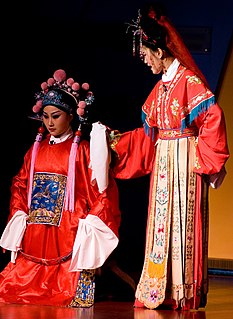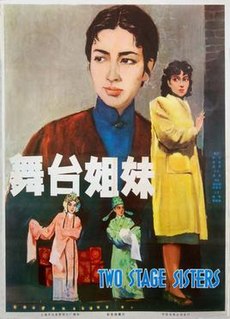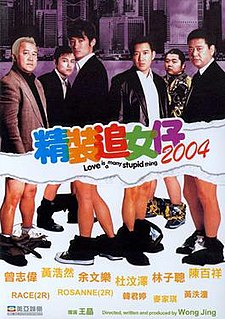Related Research Articles

Sammo Hung, also known as Hung Kam-bo (洪金寶), is a Hong Kong actor, martial artist, film producer and director, known for his work in martial arts films, Hong Kong action cinema, and as a fight choreographer for other actors such as Jackie Chan.

Yue is a group of similar Sinitic languages spoken in Southern China, particularly in Liangguang.

Betty Loh Ti, also known as Le Di or Loh Tih, was a Hong Kong actress originally from Shanghai. Known as the "Classic Beauty", she was one of the most celebrated actresses of Hong Kong cinema. She is most famous for her roles in the 1960 film The Enchanting Shadow, for which she was called "China's most beautiful actress" by the jury of the 1960 Cannes Film Festival, and The Love Eterne, which earned her the Golden Horse Award for Best Leading Actress in 1963. She died from barbiturate overdose at the age of 31.
Yoshiki Tanaka is a Japanese novelist.
Fung Fung was a veteran Hong Kong actor. He began his career as a leading man in 1946. An accident in 1949 left the left side of his face paralysed, but, while no longer able to attract leading roles, he enjoyed a long career as a character actor, appearing in films alongside such stars as Jackie Chan and Sammo Hung. He was the father of Fung Bo Bo, a child star of the 1960s, Alice Fung, a veteran actress, and Fung Hak-On, an actor known for playing villainous roles in several kung fu/action comedies of the 1970s and 1980s.

Huangmei or Huangmei tone originated as a form of rural folk song and dance that has been in existence for the last 200 years and possibly longer. Huangmei opera is one of the most famous and mainstream opera in China. The original Huangmei opera was sung by women when they were picking tea, and the opera was called the Picking Tea Song. In the late Qing dynasty, the songs came into Anhui Province— Huaining County adjacent regions, combined with the local folk art, Anqing dialect with singing and chants, and gradually developed into a newborn's operas. The music is performed with a pitch that hits high and stays high for the duration of the song. It is unique in the sense that it does not sound like the typical rhythmic Chinese opera. In the 1960s Hong Kong counted the style as much as an opera as it was a music genre. Today it is more of a traditional performance art with efforts of revival in mainland China, Hong Kong, and Taiwan, and mostly sung in Mandarin.
Iron & Silk is a 1990 Canadian action comedy-drama based on the eponymous book by American writer Mark Salzman. It details his journey to China after college to study Chinese wu shu, better known in the west as kung fu, and to teach English. Though not trained as an actor, Salzman starred as himself, as did Pan Qingfu, who claimed no one else could portray him on film. Salzman's experiences occurred in Changsha, Hunan, though the film was shot in Hangzhou, Zhejiang. The film was directed by Shirley Sun, and was the editorial debut for Geraldine Peroni.

Guo Yue is a virtuoso of the dizi and bawu. He was born in Beijing, China during the period of the Cultural Revolution. He plays a wide range of the bamboo flute and currently lives in London. He has recorded for Peter Gabriel's Real World label. He is also dedicated to cooking, and has found ways of combining cookery with flute playing at some of his concerts.

Griffin Yueh Feng was a Chinese film director and screenwriter who worked in the Cinema of Hong Kong. He worked at the Shaw Brothers Studio's for many years and directed nearly 90 films.
He Saifei is a Chinese actress of film and television, as well as a celebrated Yue opera performer of dan (female) roles. Internationally, she is best known for playing supporting roles in period films like Raise the Red Lantern (1991) and Temptress Moon (1996).
Lee Heung-kam was a Cantonese opera and TVB actress from Hong Kong.
A Test of Love may refer to:
Herman Kwan Hoi-San was a Hong Kong actor. His English name was Herman Kwan. Kwan started off as a Cantonese opera actor in street theatre before joining New Voice Opera Troupe (新聲劇團). He also started singing for early Hong Kong film soundtracks and moved on to act in films, mostly adaption of opera in Cantonese. He became famous and acted in many lead roles. When Hong Kong films started to move towards Mandarin, Kwan's career faltered and joined TVB and acted in various roles. Directors and filmmakers rediscovered his talent and cast him in many supporting roles in films. In 2001, Kwan suffered a stroke and was left mute and paralysed. He died in 2006.

Two Stage Sisters is a 1964 Chinese drama film produced by Shanghai Tianma Film Studio and directed by Xie Jin, starring Xie Fang and Cao Yindi. Made just before the Cultural Revolution, it tells the story of two female Yue opera practitioners from the same troupe who end up taking very different paths in their lives: "one succumbs to bourgeois affluence and privilege, while the other finds inspiration and fulfilment in the social commitment associated with the May Fourth movement and the thought of Lu Xun.” The film documents their journey through abusive feudal conditions in the countryside before achieving success and prestige on the stage, meanwhile historically following Shanghai's experience under Japanese and KMT rule. This original screenplay depicts the socio-political changes encompassing China from 1935-1950 through the theatrical world of Shaoxing, and accordingly mixes both a Chinese aesthetic with Hollywood and socialist realist forms. The main protagonist is said to be based on the life of Xie Jin's friend and opera-veteran Yuan Xuefen.

Yue opera, also known as Shaoxing opera, is the second most popular Chinese opera genre. Only Peking opera is more popular nationwide.

Love Is a Many Stupid Thing is a 2004 comedy film written, produced and directed by Wong Jing and starring Eric Tsang, Chapman To, Natalis Chan, Shawn Yue, Lam Chi-chung and Raymond Wong Ho-yin. The film is a parody of the 2002 hit film Infernal Affairs, which featured Tsang, To and Yue.

The Shanghai Yue Opera Group is a theatre in Shanghai, China, founded in 1950 and dedicated to Yue opera.
Beautiful Duckling is a 1965 Taiwanese film directed by Li Hsing. It tells the story of a duck man Lin Tsai-tien and his adopted daughter Hsiao-yue. Hsiao-yue knows nothing about her real descent, which Lin has designedly disguised. Her natural brother Chao-fu is a Taiwanese opera actor, he keeps asking Lin for money. He brings Hsiao-yue to the theatrical troupe to follow himself, where Hsiao-yue learns about her natural parents. Lin has to sell all his ducks, entrust Hsiao-yue to Chao-fu, and gives him money to let him start his own business. At the end of the film, Lin's son comes back, and Chao-fu repents his behavior and returns the money to Lin.

Bi Chunfang was a Chinese Yue opera performer, known as the founder of the "Bi style" of Yue opera. Born in Shanghai of Ningbo ancestry, she joined the Xuesheng troupe led by Yuan Xuefen in 1948, later joining the Dongshan troupe led by Fan Ruijuan and Fu Quanxiang. She partnered with Qi Yaxian.
Lu Jinhua was a Chinese Yue opera artist who played Sheng roles. She starred in the 1958 Yue opera film A Test of Love alongside Fu Quanxiang.
References
- Zeitlin, Judith T. (2010). "Operatic Ghosts on Screen: The Case of A Test of Love (1958)". The Opera Quarterly . 26 (2–3): 220–255. doi:10.1093/oq/kbq030 – via Project Muse.